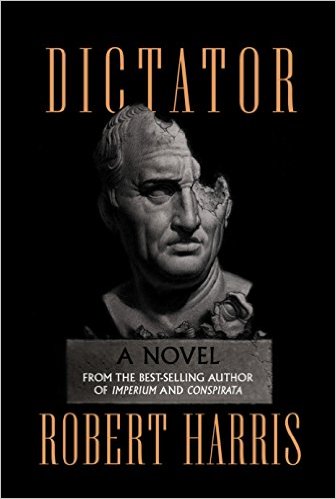After writing a mesmerizing novel about Pompeii, entitled….wait for it ‘Pompeii’ telling the story of before and after the eruption of Mt. Vesuvius in the late first century, Robert Harris turned his attention to writing a trilogy of novels about the life and times of Rome’s greatest rhetorician— Cicero. ‘Dictator’ (416 pages, published in January of this year by Knopf) brings the story of Cicero’s life to a tumultuous conclusion with both the assassination of Julius Caesar, and then the revenge killing of Cicero in the following year. The facts about Cicero’s life are of course very familiar by now, so the novel does not hold your attention by telling you things you shouldn’t already be aware of. Instead, it sucks you by giving the ‘insider’ version of Cicero’s demise, told by his trustee scribe and long time writing partner, the famous and brilliant Tiro, who invented a system of shorthand (some of which we still use, such as the abbreviations i.e. or e.g. or N.B.). The story is told from the point of view of Tiro, and it is quite simply a tale you cannot put down if you are at all interested in the period of time that led up to the NT era, with the demise of the Roman Republic and the rise of the Empire, through the Caesars. Reading novels like this is a painless way of imbibing reams of social and historical contextual information that helps you read the NT which much more understanding.
Here is the plot summary from the dustcover of the book itself—- “At the age of forty-eight, Cicero—the greatest orator of his time—is in exile, separated from his wife and children, tormented by his sense of failure, his great power sacrificed on the altar of his principles. And yet, in the words of one of his most famous aphorisms, “While there is life, there is hope.”
By promising to support Caesar—his political enemy—he is granted return to Rome. There, he fights his way back to prominence: first in the law courts, then in the Senate, and finally by the power of his pen, until at last, for one brief and glorious period, he is again the preeminent statesman in the city. Even so, no public figure, however brilliant and cunning, is completely safeguarded against the unscrupulous ambition and corruption of others.
Riveting and tumultuous, Dictator encompasses some of the most epic events in ancient history—the collapse of the Roman Republic and the subsequent civil war, the murder of Pompey, the assassination of Julius Caesar. But the central problem it presents is a timeless one: how to keep political freedom unsullied by personal ambition, vested interests, and the erosive effects of ceaseless, senseless foreign wars. In Robert Harris’s indelible portrait, Cicero attempts to answer this question with both his thoughts and his deeds, becoming a hero—brilliant, flawed, frequently fearful yet ultimately brave—both for his own time and for ours.”
There have of course been a goodly number of excellent novelists in the past few decades dealing with ancient Rome, including Colleen McCullough, Lindsey Davis, Stephen Saylor, and Harris. Davis provides the most comic relief and ancient mystery approach, Saylor gives you the most intriguing character, Gordianus, a sort of ancient Sherlock Holmes, McCullough gives the most historical and accurate detail at length, and Harris gives you the best read. If you want to compare apples to apples, then compare McCullough’s Caesar novels to Harris’ novels about the same period, in this case especially Imperium and Dictator. They are all good, but only Davis will make you laugh. It is not an accident that Harris is such a good writer, he was a columnist for the Times, and also a correspondent for the BBC. Reading him is a great, and informative pleasure. I commend this novel, but start with the first one in the trilogy by all means.













